Use Discover! above or the resources below to get the information you need for assignments.

Paraprofessional educators entered US schools amidst the struggles of the late 1960s. Immersed in the crisis of care in public education, paras improved systems of education and social welfare despite low pay and second-rate status.
Understanding paras as key players in Black and Latino struggles for jobs and freedom, Nick Juravich details how the first generation of paras in New York City transformed work in public schools and the relationships between schools and the communities they served. Paraprofessional programs created hundreds of thousands of jobs in working-class Black and Latino neighborhoods. These programs became an important pipeline for the training of Black and Latino teachers in the1970s and early 1980s while paras’ organizing helped drive the expansion and integration of public sector unions.
An engaging portrait of an invisible profession, Para Power examines the lives and practices of the first generation of paraprofessional educators against the backdrop of struggles for justice, equality, and self-determination.
*Taken from Amazon

This delightful prehistoric dictionary defines more than 100 words and phrases alongside informative entries, phonetic spellings to help pronounce the names of prehistoric creatures, and detailed anatomical illustrations.
*Taken from Amazon

In Math Cats, mathematician and professor Daniel Look, along with a clowder of his feline friends, reveals the charming connections between mathematics and cats with 22 fun and fur-filled lessons. We know all cats are cute, but only some are acute. Others are obtuse (no offense) and more are always right (and never let you forget it), as you'll learn by exploring how kitties represent different types of angles. When they curl out for a mid-day catnap, they perfectly represent the concept of a golden spiral. And when they squeeze into too small boxes or balls, they're providing a geometric lesson in topological equivalence.
*Taken from Amazon

In our increasingly distrusting and polarized nations, accusations of hypocrisy are everywhere. But the strange truth is that our attempts to stamp out hypocrisy often backfire, creating what Michael Hallsworth calls The Hypocrisy Trap. In this groundbreaking book, he shows how our relentless drive to expose inconsistency between words and deeds can actually breed more hypocrisy or, worse, cynicism that corrodes democracy itself.
Through engaging stories and original research, Hallsworth shows that not all hypocrisy is equal. While some forms genuinely destroy trust and create harm, others reflect the inevitable compromises of human nature and complex societies. The Hypocrisy Trap offers practical solutions: ways to increase our own consistency, navigate accusations wisely, and change how we judge others’ actions. Hallsworth shows vividly that we can improve our politics, businesses, and personal relationships if we rethink hypocrisy—soon.
*Taken from Amazon

In 1818, a curious root arrived in a small English village, tucked―seemingly by accident―in a packing case mailed from Brazil. The amateur botanist who cultivated it soon realized that he had something remarkable on his hands: an exceptionally rare orchid never before seen on British shores. It arrived just as “orchid mania” was sweeping across Europe and North America, driving a vast plant trade that catered to wealthy private patrons as well as the fast-growing middle classes eager to display exotic flowers at home. Dubbed Cattleya labiata, the striking purple-and-crimson bloom quickly became one of the most coveted flowers on both continents.
As tales of the flower’s beauty spread through scientific journals and the popular press, orchid dealers and enthusiasts initiated a massive search to recover it in its natural habitat. Sarah Bilston illuminates the story of this international quest, introducing the collectors and nurserymen who funded expeditions, the working-class plant hunters who set out to find the flower, the South American laborers and specialists with whom they contracted, the botanists who used the latest science to study orchids in all their varieties, and the writers and artists who established the near-mythic status of the “lost orchid.” The dark side of this global frenzy was the social and environmental harm it wrought, damaging fragile ecologies on which both humans and plants depended.
Following the human ambitions and dramas that drove an international obsession, The Lost Orchid is a story of consumer desire, scientific curiosity, and the devastating power of colonial overreach.
*Taken from Amazon

Although Portland, Oregon, is sometimes called “America’s Whitest city,” Black residents who grew up there made it their own. The neighborhoods of Northeast Portland, also called “Albina,” were a haven for and a hub of Black community life. But between 1990 and 2010, Albina changed dramatically—it became majority White.
In We Belong Here, sociologist Shani Adia Evans offers an intimate look at gentrification from the inside, documenting the reactions of Albina residents as the racial demographics of their neighborhood shift. As White culture becomes centered in Northeast, Black residents recount their experiences with what Evans refers to as “White watching,” the questioning look on the faces of White people they encounter, which conveys an exclusionary message: “What are you doing here?” This, Evans shows, is a prime example of what she calls “White spacemaking”: the establishment of White space—spaces in which Whiteness is assumed to be the norm and non-Whites are treated with suspicion—in formerly non-White neighborhoods. Evans also documents Black residents’ efforts to create and maintain places for Black belonging in White-dominated Portland. While gentrification typically describes socioeconomic changes that may have racial implications, White spacemaking allows us to understand racism as a primary mechanism of neighborhood change. We Belong Here illuminates why gentrification and White spacemaking should be examined as intersecting, but not interchangeable, processes of neighborhood change.
*Taken from Amazon
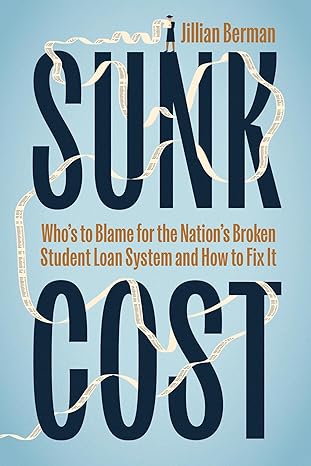
Student-loan horror stories are a dime a dozen. But students today are faced with a seemingly insurmountable paradox: Research consistently shows that the clearest viable option to financial stability is a college degree. But if and when Americans decide to pursue diplomas, student loan payments quickly follow, and even after securing full-time employment, many borrowers struggle to make ends meet for years. In Sunk Cost, journalist Jillian Berman explores how the nation’s student loan program went from a well-intentioned initiative aimed at helping low- and middle-income students afford college to one that traps borrowers in long-term debt.
Berman interviewed dozens of borrowers and policymakers and dug into the archives to unearth the true causes of the student loan problem. A couple of generations ago, policy makers generously subsidized Americans’ college educations because they knew it would be advantageous for the entire country: a more educated population meant better quality of life for all. But today, higher education is viewed as an individual goal, so students and their families are expected to be on the hook for it themselves. Berman explains how this enormous shift happened, which industries benefit from it, and what it means for college-going Americans today. She shares real-life stories of college graduates who are being crushed under some of the harshest consequences of the student loan system. These borrowers pursued higher education in hopes of a better life and yet some have been trapped in debt for decades, making it difficult to put food on the table, much less imagine a life beyond debt.
By connecting personal accounts to the policy history of student loans, Berman makes clear that if American society continues to push students toward higher education, but fails to truly subsidize it, the financial strain will become unbearable for all but the most privileged. The current system is broken, but Berman proposes that significant changes are possible, and will require political will from state lawmakers and Congress, along with a philosophical shift, to tackle one of the largest consumer finance challenges of our time.
*Taken from Amazon
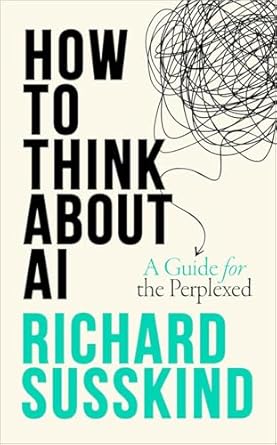
In recent years, and certainly since the launch of ChatGPT, there has been massive public and professional interest in Artificial Intelligence. But people are confused about what AI is, what it can and cannot do, what is yet to come, and whether AI is good or bad for humanity and civilisation - whether it will provide solutions to mankind's major challenges or become our gravest existential threat. There is also confusion about how we should regulate AI and where we should draw moral boundaries on its use.
In How To Think About AI, Richard Susskind draws on his experience of working on AI since the early 1980s. For Susskind, balancing the benefits and threats of artificial intelligence is the defining challenge of our age. He explores the history of AI and possible scenarios for its future. His views on AI are not always conventional. He positions ChatGPT and generative AI as no more than the latest chapter in the ongoing story of AI and claims we are still at the foothills of developments. He argues that to think responsibly about the impact of AI requires us to look well beyond todayâs technologies, suggesting that not-yet-invented technologies will have far greater impact on us in the 2030s than the tools we have today. This leads Susskind to discuss the possibility of conscious machines, magnificent new AI-enabled virtual worlds, and the impact of AI on the evolution of biological humans.
*Taken from Amazon

This cookie has never felt like a smart cookie no matter how hard she tries, especially in comparison to all the clever cupcakes and brilliant rolls in the bakery. Will a dash of creativity and a sprinkle of confidence be enough to help her learn that perfect scores and having all the answers aren’t the only ingredients for intelligence?
*Taken from Amazon

From writing fan fiction to campaigning for better media representation, fandom and participatory culture have long been seen as tools to resist dominant narratives and fight for a better future. But participatory culture is not always socially and politically progressive; rather, as Participatory Culture Wars demonstrates, it can be politically regressive and socially reactive. Communities coalesce around the exclusionary and the misinformed.
Fans, fandoms, and fan practices are no longer the realm of media and popular culture; they have been adopted and co-opted across the contemporary political terrain. This volume offers specific examples and suggests approaches that can help make sense of the constantly shifting interaction between fandom and politics.
*Taken from Amazon
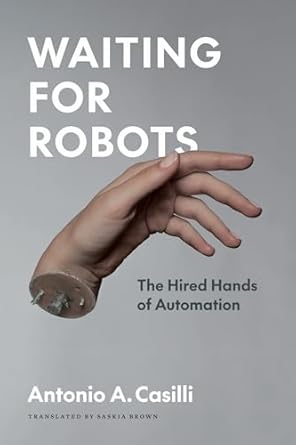
Artificial Intelligence fuels both enthusiasm and panic. Technologists are inclined to give their creations leeway, pretend they’re animated beings, and consider them efficient. As users, we may complain when these technologies don’t obey, or worry about their influence on our choices and our livelihoods. And yet, we also yearn for their convenience, see ourselves reflected in them, and treat them as something entirely new. But when we overestimate the automation of these tools, award-winning author Antonio A. Casilli argues, we fail to recognize how our fellow humans are essential to their efficiency. The danger is not that robots will take our jobs, but that humans will have to do theirs.
In this bracing and powerful book, Casilli uses up-to-the-minute research to show how today’s technologies, including AI, continue to exploit human labor—even ours. He connects the diverse activities of today’s tech laborers: platform workers, like Uber drivers and Airbnb hosts; “micro workers,” including those performing atomized tasks like data entry on Amazon Mechanical Turk; and the rest of us, as we evaluate text or images to show we’re not robots, react to Facebook posts, or approve or improve the output of generative AI. As Casilli shows us, algorithms, search engines, and voice assistants wouldn’t function without unpaid or underpaid human contributions. Further, he warns that if we fail to recognize this human work, we risk a dark future for all human labor.
Waiting for Robots urges us to move beyond the simplistic notion that machines are intelligent and autonomous. As the proverbial Godot, robots are the bearers of a messianic promise that is always postponed. Instead of bringing prosperity for all, they discipline the workforce, so we don’t dream of a world without drudgery and exploitation. Casilli’s eye-opening book makes clear that most “automation” requires human labor—and likely always will—shedding new light on today’s consequences and tomorrow’s threats of failing to recognize and compensate the “click workers” of today.
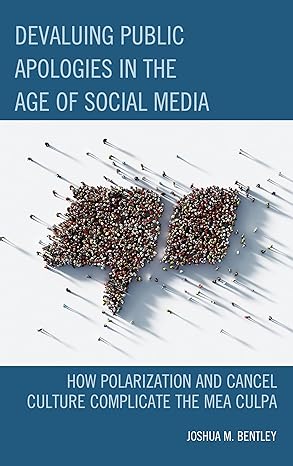
In Devaluing Public Apologies in the Age of Social Media, Joshua M. Bentley argues that apologies are losing their meaning in American society as organizations and public figures treat them as strategical tools without considering their ethical implications. As the demand for apologies in the age of social media continues to increase exponentially, Bentley posits, the apologies that are given carry less and less weight to the public. This book examines how controversial figures like Donald Trump and Joe Rogan, as well as brands like Google and Bud Light, have addressed public controversies both effectively and ineffectively, illustrating how social media, polarization, and cancel culture are changing the way apologies are given and received. If apologies are to serve their historical role of resolving conflict peacefully, Bentley argues, they must be placed back into their proper ethical context. This book offers insight on how individuals and organizations can ensure their apologies reflect their authentic values. Scholars of communication, ethics, media studies, political science, and public relations will find it especially useful.
*Taken from Amazon
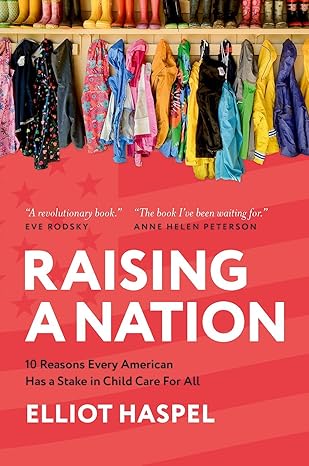
Raising a Nation offers a new framework for thinking about a comprehensive, inclusive child care system: one that supports families in all their diversity, whether they want to utilize a licensed child care program, family member, or have a parent as the primary child care provider.
Thanks to a history of neglect, child care in America is expensive, scarce, and of questionable quality. Yet too often the response is not a push for governmental action but a derisive, "Why should I pay for your child?" At best, leaders make the case for child care on bloodless economic grounds: We need a place to put the kids so parents can work. Elliot Haspel argues that a key step has been missed. A step so fundamental that it has ruined the chances of winning an effective child care system, despite decades of pain that cross geographic and ideological borders. Establishing that good child care belongs among the pantheon of American values.
Haspel makes ten distinct but interlinking cases for why every American--whatever their political affiliation, and whether or not they have young children or any children at all--has a stake in ensuring a strong child care system to facilitate strong families and a strong nation. This groundbreaking book opens up conversations that can finally push child care from being seen as a private responsibility to being viewed as an essential part of the American social fabric.
*Taken from Amazon

Based on extensive interviews with students, college administrators, policymakers, and other leaders, The Student Debt Crisis illuminates one of the nation's most urgent and pressing civil rights questions of the last three decades: Who gets to go to college? This book comprehensively examines the history and current state of the student debt crisis in the US. With a focus on the moral imperative of ensuring equal access to higher education, The Student Debt Crisis highlights the disproportionate impact of student debt on Black and brown students, particularly Black women. By delving into the history and practical realities of student debt, higher-education journalist Jamal Watson sheds light on the challenges faced by debt-laden college graduates and non-graduates alike.
From the rising number of borrowers defaulting on their loans to the barriers that hinder accessibility for those from diverse socioeconomic backgrounds, Watson offers a deeper understanding of the student debt crisis on macro and micro levels. As the spotlight on student debt continues to grow, The Student Debt Crisis is a vital resource for anyone seeking a comprehensive understanding of this issue. From policymakers shaping paths of action to families and students navigating educational choices, this book offers essential insights and potential solutions to these pressing challenges.
*Taken from Amazon

After decades of union decline and rising inequality, an inspiring wave of workplace organizing—from Starbucks stores to Amazon warehouses to southern auto factories—has thrust unionization into the national spotlight. By analyzing this surge and telling the stories of the courageous workers driving it forward, We Are the Union makes a case for how to overcome business as usual in both corporate America and organized labor.
Eric Blanc shows that recent struggles have developed a new organizing model, worker-to-worker unionism, which builds scalable power by giving rank-and-filers an unprecedented degree of leadership. Through digital tools and ambitious campaigns, young worker leaders are turning the labor movement back into a movement—and they're winning. Rigorously researched and compellingly written, We Are the Union illustrates how this new grassroots approach can exponentially grow the power of working people to overcome economic exploitation, racial injustice, and authoritarianism at work and beyond.
*Taken from Amazon

For close to a decade, technology analyst Dan Wang―“a gifted observer of contemporary China” (Ross Douthat)―has been living through the country’s astonishing, messy progress. China’s towering bridges, gleaming railways, and sprawling factories have improved economic outcomes in record time. But rapid change has also sent ripples of pain throughout the society. This reality―political repression and astonishing growth―is not a paradox, but rather a feature of China’s engineering mindset.
In Breakneck, Wang blends political, economic, and philosophical analysis with reportage to reveal a provocative new framework for understanding China―one that helps us see America more clearly, too. While China is an engineering state, relentlessly pursuing megaprojects, the United States has stalled. America has transformed into a lawyerly society, reflexively blocking everything, good and bad
Blending razor-sharp analysis with immersive storytelling, Wang offers a gripping portrait of a nation in flux. Breakneck traverses metropolises like Shanghai, Chongqing, and Shenzhen, where the engineering state has created not only dazzling infrastructure but also a sense of optimism. The book also exposes the downsides of social engineering, including the surveillance of ethnic minorities, political suppression, and the traumas of the one-child policy and zero-Covid.
In an era of animosity and mistrust, Wang unmasks the shocking similarities between the United States and China. Breakneck reveals how each country points toward a better path for the other: Chinese citizens would be better off if their government could learn to value individual liberties, while Americans would be better off if their government could learn to embrace engineering―and to produce better outcomes for the many, not just the few.
*Taken from Amazon

The world history ancient civilizations book contains 400 pages with discoveries in main areas: medicine, basic materials, mechanisms, military arts, hearth and home, farming, entertainment, musical instruments, and society. We combined a clear structure, high-quality texts, and detailed images to completely immerse you in the story.
*Taken from Amazon
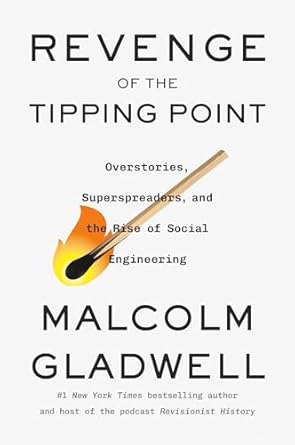
Why is Miami…Miami? What does the heartbreaking fate of the cheetah tell us about the way we raise our children? Why do Ivy League schools care so much about sports? What is the Magic Third, and what does it mean for racial harmony? In this provocative new work, Malcolm Gladwell returns for the first time in twenty-five years to the subject of social epidemics and tipping points, this time with the aim of explaining the dark side of contagious phenomena.
Through a series of riveting stories, Gladwell traces the rise of a new and troubling form of social engineering. He takes us to the streets of Los Angeles to meet the world’s most successful bank robbers, rediscovers a forgotten television show from the 1970s that changed the world, visits the site of a historic experiment on a tiny cul-de-sac in northern California, and offers an alternate history of two of the biggest epidemics of our day: COVID and the opioid crisis. Revenge of the Tipping Point is Gladwell’s most personal book yet. With his characteristic mix of storytelling and social science, he offers a guide to making sense of the contagions of modern world. It’s time we took tipping points seriously.
*Taken from Amazon
We have created an Organization in IvyLearn that houses all of the tutoring information for the Lafayette campus. We offer tutoring in a variety of subjects, with both virtual and in-person options. You can find tutor schedules for both types of tutoring on the Org, which also holds the Zoom tutoring rooms for math, science, writing, and more. These rooms will be available for you to log in and work with tutors and your fellow students.
In addition to schedules, Zoom links, and contact info, the Org contains resources for your success posted by our tutors.
If you are interested in joining the Org, please email Amanda Simmons at asimmons69@ivytech.edu and she will add you to the Org. You will then be emailed an invitation to join. Once you accept the invitation, the Virtual Tutoring Organization–Lafayette will appear in your dashboard in IvyLearn.
